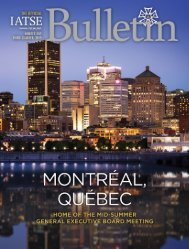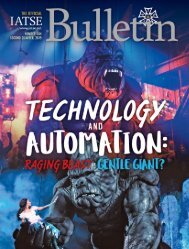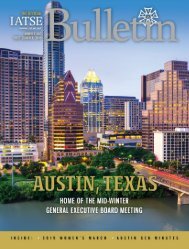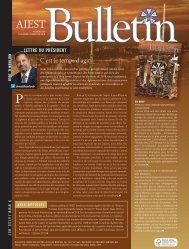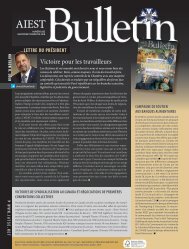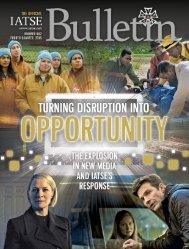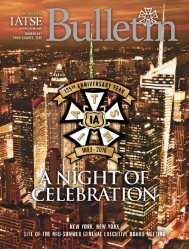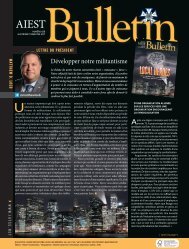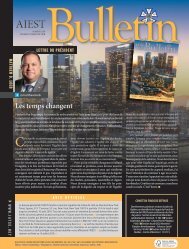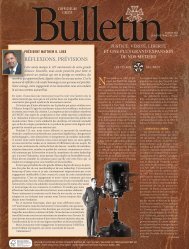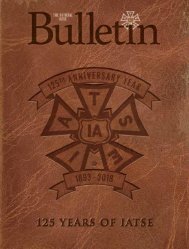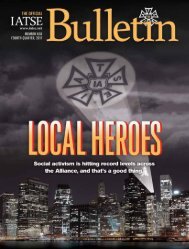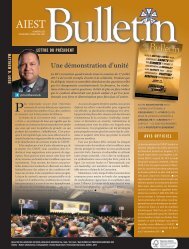Create successful ePaper yourself
Turn your PDF publications into a flip-book with our unique Google optimized e-Paper software.
did not seek another term. Therefore,<br />
the NLRB currently has two Democratic<br />
appointees and two Republican appointees.<br />
However, the President recently<br />
appointed a management-side attorney<br />
to the seat left vacant by Miscimarra’s departure.<br />
It is expected that the nominee<br />
will be confirmed and seated in the next<br />
several months, again giving Republican<br />
members the majority.<br />
The report also described changes<br />
expected from the U.S. Department of<br />
Labor’s Office of Labor-Management<br />
Standards (OLMS). OLMS is preparing<br />
to revive two proposals from the prior<br />
Republican presidency, both of which<br />
involve union disclosure requirements.<br />
The first change would subject certain<br />
union “intermediate bodies,” to financial<br />
reporting requirements. It would hold<br />
public sector intermediate bodies responsible<br />
for annual disclosure reports if they<br />
are subsidiaries of private-sector national<br />
unions. Second, OLMS may seek to reestablish<br />
a reporting requirement obligating<br />
unions to file annual financial reports<br />
related to union-affiliated trust funds.<br />
Union trusts, such as training funds, and<br />
apprenticeship programs could be the<br />
subject of these reporting mandates. The<br />
prior Republican administration attempted<br />
to establish a similar reporting obligation<br />
(known as the “Form T-1”) which<br />
was rescinded in 2010. These matters are<br />
in early stages. OLMS will issue more information<br />
in March <strong>2018</strong>.<br />
The report also noted that two<br />
cases of vital importance to unions and<br />
working people in the United States are<br />
now pending before the U.S. Supreme<br />
Court. In Janus v. AFSCME (which will be<br />
argued on February 26, <strong>2018</strong>) the Court<br />
may overrule existing precedent in deciding<br />
whether public employees who are<br />
not union members can be required to<br />
pay a fair share of union dues to support<br />
their union’s bargaining activities. This<br />
case could have significant detrimental<br />
effects on membership in public sector<br />
unions across the country. In NLRB<br />
v. Murphy Oil, the Court must decide<br />
whether employers’ arbitration agreements<br />
with individual employees that bar<br />
work-related group claims are enforceable<br />
under federal labor law. The outcome of<br />
this case will also have significant effects.<br />
It could become difficult if not impossible<br />
for workers to assert their rights under a<br />
vast number of employment laws.<br />
Canadian Counsel Ernie Schirru<br />
provided the Board with an overview of<br />
matters important to the IA in Canada.<br />
The Board was first updated on the<br />
status of ongoing litigation commenced<br />
by Matthew Della Polla against, among<br />
others, the International and <strong>IATSE</strong> Local<br />
58 in a claim alleging breach of contract,<br />
negligence and personal injury arising<br />
from alleged injuries sustained by Della<br />
Polla during a concert at Exhibition Place<br />
in Toronto, Ontario in December 2013<br />
where Local 58 members were working as<br />
the stage crew.<br />
Counsel Schirru then went on to<br />
provide a summary of the recent decision<br />
of the Supreme Court of Canada<br />
(“SCC”) in British Columbia Human<br />
Rights Tribunal v. Schrenk. This SCC decision<br />
was issued in December 2017 and<br />
was financially supported by the labour<br />
movement, including <strong>IATSE</strong>. The case<br />
involved an allegation of discrimination<br />
and harassment in the course of employment<br />
by a complainant working on a road<br />
improvement project against Schrenk, an<br />
individual who was not the complainant’s<br />
employer nor employed by his employer,<br />
but rather a consultant working on the<br />
same project. The complainant alleged<br />
that Schrenk made derogatory comments<br />
about his place of birth, religion<br />
and sexual orientation while they both<br />
worked on the project. Schrenk and his<br />
employer consistently claimed they were<br />
not in an employment relationship with<br />
the complainant and therefore the complainant<br />
had no viable claims. In issuing<br />
its decision, the SCC found that the<br />
British Columbia Human Rights Code<br />
protects individuals from discriminatory<br />
conduct in the workplace no matter<br />
the identity of the perpetrator. In other<br />
words, the British Columbia Code does<br />
not restrict who can perpetrate discrimination,<br />
rather it prohibits discriminatory<br />
conduct that targets employees so long as<br />
that conduct has a sufficient nexus to the<br />
employment context.<br />
Given the similarities in the wording<br />
of human rights legislation across<br />
Canada, the SCC’s decision in Schrenk<br />
provides employees with further protection<br />
against discrimination and harassment<br />
by anyone in the workplace. It is<br />
as a workplace human rights victory for<br />
employees and the labour movement.<br />
This decision is particularly important for<br />
<strong>IATSE</strong> members, who are regularly employed<br />
in workplace settings that include<br />
a variety of different individuals and organizations<br />
for which there is no direct<br />
employment relationship.<br />
President Loeb thanked the Legal Department<br />
for its report and noted that it<br />
is important for the Board to remain apprised<br />
of significant legal decisions that<br />
FIRST QUARTER <strong>2018</strong> 47



